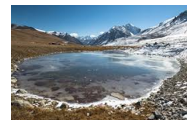INP-WealthPk
Faiza Tehseen
Pakistan can promote ecotourism by tapping the true potential of the Khunjerab National Park in Gilgit-Baltistan region.

Speaking to WealthPK, Rahat Karim Baig, deputy director of GB tourism department, Baltistan region, said, “The inadequate promotion of Khunjerab National Park both at national and international levels is hindering the development of ecotourism. “National parks are great assets for a country as they are the places where responsible tourism practices can be promoted.” He said that local communities should also be made aware of the importance of guarding the flora and fauna in the national park. “Responsible tourism, conservation and safety of nature cannot be made possible without the involvement of local people.” Baig said the border corridor between Pakistan and China passed through the Khunjerab National Park. He said that the area of the park should be declared as a buffer zone to help conserve it.
Baig said, “It is also important to guide the local people that national parks are not the ordinary places to roam but they are special protected places. The care for these places will not only bring sustainable source of livelihood for people but also help cope with the climatic impacts.” He said Khunjerab National Park was located in the gorgeous Karakoram range, a sanctuary of rare flora and fauna. “All the stakeholders, including the government and the local communities, should collaborate to retain the true form of the park.” The GB tourism department official advocated launching targeted marketing campaigns highlighting the unique features of this park. He also called for starting capacity-building programmes for tour operators, local guides, and all the other stakeholders.
Speaking to WealthPK, Muhammad Atif Majeed, Deputy Director at Pakistan Forest Institute, Peshawar, said Khunjerab National Park was established in 1975 by then prime minister late Zulfikar Ali Bhutto to protect the Marco Polo sheep (as well as snow leopards and bharal) living in the area. “At an elevation of about 17,000 feet and covering an area of around 2,269 square kilometres, Khunjerab National Park is no doubt a breathtaking place.” He said tourism could be a good source of income in distant areas where no other regular means of income generation were available. “But it is also necessary to keep in mind that national parks are not the ordinary places, and they cannot be turned into regular tourist spots. Only extremely responsible tourism can be allowed there under strict code of ethics to avoid any harm to natural flora and fauna.”
Credit: INP-WealthPk













